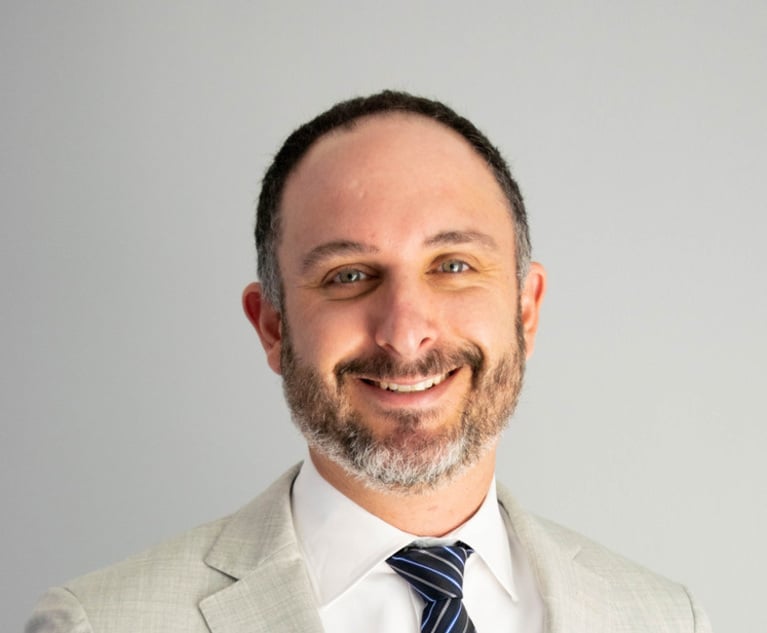Is The Scaffold Law's 'Strict Liability' Taking a 'Step' Down?
George M. Heymann writes: 'O'Brien v. Port Authority' appears to be an outlier among the numerous Court of Appeals decisions on the Scaffold Law. Although the majority notes that this case is one of limited application, because the staircase at issue was immovable and not subject to collapsing as are other protective devices, its determination that defendants' expert raised questions of fact sufficient to defeat a motion for summary judgment may have the unintended effect of opening a floodgate of defense experts in subsequent Labor Law §240(1) cases
August 01, 2017 at 02:01 PM
21 minute read
In the past quarter century, a vast body of case law has been written about New York's Scaffold Law with varying results for the injured workers seeking relief under this statute.1
The first paragraph of §240(1) of the Labor Law contains two distinct criteria, each of which comes into play when an injured worker seeks recovery under this statute. In relevant part, Labor Law §240(1) reads as follows:
All contractors and owners and their agents, … [1] in the erection, demolition, repairing, altering, painting, cleaning or pointing of a building or structure [2] shall furnish or erect, or cause to be furnished or erected for the purpose of such labor, scaffolding, hoists, stays, ladders, slings, hangers, blocks, pulleys, braces, irons, ropes, and other devices which shall be so constructed, placed and operated as to give proper protection to a person so employed. (bracketed numbers added) (emphasis added)
This content has been archived. It is available through our partners, LexisNexis® and Bloomberg Law.
To view this content, please continue to their sites.
Not a Lexis Subscriber?
Subscribe Now
Not a Bloomberg Law Subscriber?
Subscribe Now
NOT FOR REPRINT
© 2024 ALM Global, LLC, All Rights Reserved. Request academic re-use from www.copyright.com. All other uses, submit a request to [email protected]. For more information visit Asset & Logo Licensing.
You Might Like
View All
Impact of New NYS Workers’ Compensation Work-Related Stress Relief on Discrimination Claims

Storefront Pro Bono: Proposal for Modest Law Firm Commitment to Provide Direct Legal Services
22 minute read
Recent Developments Regarding the Ending Forced Arbitration of Sexual Assault and Sexual Harassment Act of 2021
9 minute read
Trending Stories
- 1Tik Tok’s ‘Blackout Challenge’ Confronts the Limits of CDA Section 230 Immunity
- 2AI and the Evolution of Legal Talent Functions
- 3Morgan Lewis To Acquire Kramer Levin's Paris Office
- 4Advice to Practicing Lawyers About Their Future
- 5Retired Judges Say Newman’s Challenge to Disability Law Should Proceed
Who Got The Work
Michael G. Bongiorno, Andrew Scott Dulberg and Elizabeth E. Driscoll from Wilmer Cutler Pickering Hale and Dorr have stepped in to represent Symbotic Inc., an A.I.-enabled technology platform that focuses on increasing supply chain efficiency, and other defendants in a pending shareholder derivative lawsuit. The case, filed Oct. 2 in Massachusetts District Court by the Brown Law Firm on behalf of Stephen Austen, accuses certain officers and directors of misleading investors in regard to Symbotic's potential for margin growth by failing to disclose that the company was not equipped to timely deploy its systems or manage expenses through project delays. The case, assigned to U.S. District Judge Nathaniel M. Gorton, is 1:24-cv-12522, Austen v. Cohen et al.
Who Got The Work
Edmund Polubinski and Marie Killmond of Davis Polk & Wardwell have entered appearances for data platform software development company MongoDB and other defendants in a pending shareholder derivative lawsuit. The action, filed Oct. 7 in New York Southern District Court by the Brown Law Firm, accuses the company's directors and/or officers of falsely expressing confidence in the company’s restructuring of its sales incentive plan and downplaying the severity of decreases in its upfront commitments. The case is 1:24-cv-07594, Roy v. Ittycheria et al.
Who Got The Work
Amy O. Bruchs and Kurt F. Ellison of Michael Best & Friedrich have entered appearances for Epic Systems Corp. in a pending employment discrimination lawsuit. The suit was filed Sept. 7 in Wisconsin Western District Court by Levine Eisberner LLC and Siri & Glimstad on behalf of a project manager who claims that he was wrongfully terminated after applying for a religious exemption to the defendant's COVID-19 vaccine mandate. The case, assigned to U.S. Magistrate Judge Anita Marie Boor, is 3:24-cv-00630, Secker, Nathan v. Epic Systems Corporation.
Who Got The Work
David X. Sullivan, Thomas J. Finn and Gregory A. Hall from McCarter & English have entered appearances for Sunrun Installation Services in a pending civil rights lawsuit. The complaint was filed Sept. 4 in Connecticut District Court by attorney Robert M. Berke on behalf of former employee George Edward Steins, who was arrested and charged with employing an unregistered home improvement salesperson. The complaint alleges that had Sunrun informed the Connecticut Department of Consumer Protection that the plaintiff's employment had ended in 2017 and that he no longer held Sunrun's home improvement contractor license, he would not have been hit with charges, which were dismissed in May 2024. The case, assigned to U.S. District Judge Jeffrey A. Meyer, is 3:24-cv-01423, Steins v. Sunrun, Inc. et al.
Who Got The Work
Greenberg Traurig shareholder Joshua L. Raskin has entered an appearance for boohoo.com UK Ltd. in a pending patent infringement lawsuit. The suit, filed Sept. 3 in Texas Eastern District Court by Rozier Hardt McDonough on behalf of Alto Dynamics, asserts five patents related to an online shopping platform. The case, assigned to U.S. District Judge Rodney Gilstrap, is 2:24-cv-00719, Alto Dynamics, LLC v. boohoo.com UK Limited.
Featured Firms
Law Offices of Gary Martin Hays & Associates, P.C.
(470) 294-1674
Law Offices of Mark E. Salomone
(857) 444-6468
Smith & Hassler
(713) 739-1250






